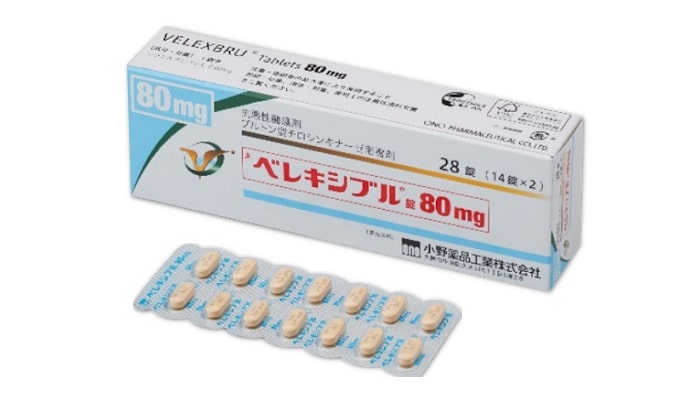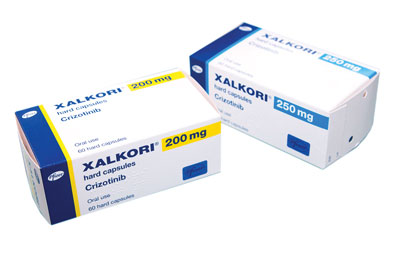Velexbru (tirabrutinib hydrochloride) vs Xalkori (crizotinib)
Velexbru (tirabrutinib hydrochloride) vs Xalkori (crizotinib)
Velexbru (tirabrutinib hydrochloride) is a Bruton's tyrosine kinase (BTK) inhibitor primarily used for the treatment of certain B-cell malignancies, such as mantle cell lymphoma, while Xalkori (crizotinib) is an ALK and ROS1 inhibitor indicated for non-small cell lung cancer (NSCLC) with specific genetic alterations. The choice between Velexbru and Xalkori would depend on the specific type of cancer a patient has and the presence of genetic markers that are targeted by these drugs. It is crucial for patients to undergo genetic testing to determine the presence of BTK mutations for Velexbru or ALK/ROS1 mutations for Xalkori, as these tests will guide their oncologist in making the most appropriate treatment decision.
Difference between Velexbru and Xalkori
| Metric | Velexbru (tirabrutinib hydrochloride) | Xalkori (crizotinib) |
|---|---|---|
| Generic name | Tirabrutinib | Crizotinib |
| Indications | Relapsed or refractory primary central nervous system lymphoma | Non-small cell lung cancer, ROS1-positive advanced non-small cell lung cancer, and ALK-positive metastatic non-small cell lung cancer |
| Mechanism of action | Bruton's tyrosine kinase (BTK) inhibitor | Anaplastic lymphoma kinase (ALK) and c-Met/hepatocyte growth factor receptor (HGFR) inhibitor |
| Brand names | Velexbru | Xalkori |
| Administrative route | Oral | Oral |
| Side effects | Neutropenia, thrombocytopenia, rash, diarrhea, etc. | Visual disorders, gastrointestinal disturbances, edema, elevated transaminases, etc. |
| Contraindications | Hypersensitivity to tirabrutinib or any component of the formulation | Hypersensitivity to crizotinib or any excipients in the formulation |
| Drug class | BTK inhibitor | ALK and MET inhibitor |
| Manufacturer | Ono Pharmaceutical Co., Ltd. | Pfizer Inc. |
Efficacy
Velexbru (Tirabrutinib Hydrochloride) Efficacy in Treating Lymphoma
Velexbru, known by its generic name tirabrutinib hydrochloride, is a Bruton's tyrosine kinase (BTK) inhibitor that has shown efficacy in treating certain types of lymphoma. Specifically, tirabrutinib has been studied for its use in treating B-cell malignancies, including certain forms of non-Hodgkin lymphoma (NHL). Clinical trials have demonstrated that tirabrutinib can lead to a reduction in tumor burden and prolong progression-free survival in patients with relapsed or refractory mantle cell lymphoma, which is a subtype of NHL. The response rates observed in these studies suggest that Velexbru may be an effective therapeutic option for patients with this challenging condition.
However, it is important to note that the efficacy of Velexbru can vary depending on the specific characteristics of the lymphoma, such as genetic mutations and previous treatments. As with any medication, the effectiveness of tirabrutinib should be evaluated on a case-by-case basis, and it is crucial to consider the individual patient's overall health and treatment history when assessing the potential benefits of Velexbru.
Xalkori (Crizotinib) Efficacy in Treating Lymphoma
Xalkori, with the generic name crizotinib, is a small molecule tyrosine kinase inhibitor primarily used to treat non-small cell lung cancer (NSCLC) with specific genetic alterations. While crizotinib is not traditionally used to treat lymphoma, there have been some studies exploring its off-label use in lymphomas that harbor abnormalities in the ALK (anaplastic lymphoma kinase) gene. In these limited studies, Xalkori has shown some efficacy in inducing responses in patients with ALK-positive anaplastic large cell lymphoma, which is a rare type of NHL. However, the evidence for crizotinib's use in lymphoma is not as robust as for its use in NSCLC, and more research is needed to fully understand its potential role in this setting.
Given the off-label nature of crizotinib's use in lymphoma, it is essential for healthcare providers to carefully consider the existing clinical evidence and to weigh the potential risks and benefits before prescribing Xalkori for lymphoma patients. Furthermore, the use of crizotinib in lymphoma should be guided by the presence of ALK genetic alterations, and patients should be monitored closely for treatment response and adverse effects.
Regulatory Agency Approvals
Velexbru
-
Pharmaceuticals and Medical Devices Agency (PMDA), Japan

Xalkori
-
European Medical Agency (EMA), European Union

-
Food and Drug Administration (FDA), USA

-
Health Canada

-
Pharmaceuticals and Medical Devices Agency (PMDA), Japan

-
Therapeutic Goods Administration (TGA), Australia

Access Velexbru or Xalkori today
If Velexbru or Xalkori are not approved or available in your country (e.g. due to supply issues), you can access them via Everyone.org.
How it works

Make an enquiry
Choose the medicine you want to buy, answer a couple of questions, and upload your prescription to speed things up. We’ll get back to you within 24 hours.


Make an enquiry
Choose the medicine you want to buy, answer a couple of questions, and upload your prescription to speed things up. We’ll get back to you within 24 hours.


Breeze through the paperwork
We'll guide you through the required documents for importing unapproved medicine, ensuring you have all the necessary information.


Get a personalized quote
We’ll prepare a quote for you, including medicine costs and any shipping, administrative, or import fees that may apply.


Receive your medicine
Accept the quote and we’ll handle the rest - sourcing and safely delivering your medicine.

Some text on this page has been automatically generated. Speak to your physician before you start a new treatment or medication.
Let's talk
If you have any questions, call us or send us a message through WhatsApp or email:
Contact us




